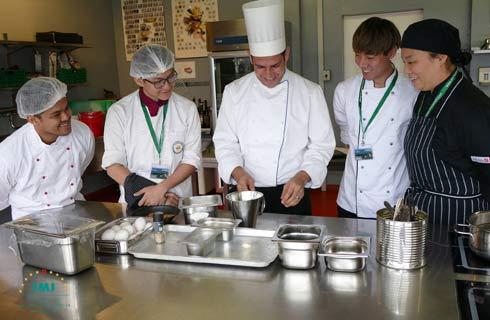Bachelor of Science in Biology: Entomology

学历文凭
Bachelor Degree

专业院系
昆虫学

开学时间

课程时长

课程学费

国际学生入学条件
To be considered for admission to Washington State University as a freshman, a student needs to complete at least 12 years of school, culminating in an appropriate secondary certificate or external examination. (We may consider the first year or two of university in some countries to be secondary level.) Schooling should include preparation in humanities, mathematics, basic sciences, and social sciences. WSU requires a minimum grade point average of 2.70 (on a 4.00 scale) for admission as an international freshman. TOEFL: 213 computer-based (CBT), 79 internet-based (iBT), 550 paper-based (PBT). IELTS: 6.5. SAT: 500 Critical Reading Sub Score
IDP—雅思考试联合主办方

雅思考试总分
6.5
了解更多
- 雅思总分:6.5
- 托福网考总分:79
- 托福笔试总分:550
- 其他语言考试:MELAB: 77
CRICOS代码:
申请截止日期:请 与IDP联系 以获取详细信息。
课程简介
Biology is the science of life. The study of biology encompasses molecular, cellular, and physiological processes, evolutionary diversity, ecological relationships, and global systems. Biologists study life from prehistoric times to organisms alive today and model how life may change in the future. Build a strong foundation in the sciences. Use options to focus on depth and breadth of interest areas. Courses cover biology, including molecular and cell biology, physiology and development of animals and plants, conservation biology, disease biology, genetics and genomics, taxonomy and systematics, ecology, and evolutionary biology. Small class sizes in advanced courses. Opportunities for one-on-one research with biology faculty, including field and laboratory experiences. Gain skills in research design, data analysis, DNA and cell biological techniques, physiological diagnostics, ecological and environmental assessment, phylogenetic and evolutionary analysis, global complex systems analysis, computer modeling and simulations, scientific writing, and professional communications. Prepare for graduate and professional schools. Math, science, and engineering community residence halls with other entering students in shared classes provide opportunities for group study, free tutoring, and computer lab access. Conner Museum of Natural History and Marion Ownbey Herbarium offer specimens of animals and plants for research and study.<br><br>Insects and other related arthropods are the dominant consumers in all terrestrial ecosystems. There are more kinds of insects than all the other species of animals and plants combined. In a practical sense, insects compete at all levels with humans in the production, processing, and use of food and fiber resources and constitute a major threat to human health in much of the world. A detailed understanding of insect biology is a prerequisite to developing rational, effective, and sustainable control measures. Similarly, an understanding of the ecological ramifications of such control measures, particularly pesticide use, is a legal and ethical requirement.
相关申请

预科

奖学金

实习机会

在校学习

跨境学习

校园授课-线上开始

在线/远程学习
学校排名
世界排名
301
数据源:泰晤士高等教育世界大学排名
本校相关课程
学术英语(1个学期)

学历文凭
English
下一个开始日期
课程费用总额
学术英语(2学期)

学历文凭
English
下一个开始日期
课程费用总额
学术英语(3个学期)

学历文凭
English
下一个开始日期
课程费用总额
International Year One in Agricultural Sciences (1 Semester)

学历文凭
Foundation for Undergraduate
下一个开始日期
课程费用总额
International Year One in Agricultural Sciences (2 Semester)

学历文凭
Foundation for Undergraduate
下一个开始日期
课程费用总额
International Year One in Architecture (1 Semester)

学历文凭
Foundation for Undergraduate
下一个开始日期
课程费用总额
其他相关课程
昆虫学博士

麦吉尔大学继续教育学院
泰晤士高等教育世界大学排名:

学历文凭
Ph.D.
下一个开始日期
课程费用总额
昆虫学哲学博士-新热带环境

麦吉尔大学继续教育学院
泰晤士高等教育世界大学排名:

学历文凭
Ph.D.
下一个开始日期
课程费用总额
昆虫学哲学博士-环境

麦吉尔大学继续教育学院
泰晤士高等教育世界大学排名:

学历文凭
Ph.D.
下一个开始日期
课程费用总额
昆虫学理学硕士-新热带环境(论文)

麦吉尔大学继续教育学院
泰晤士高等教育世界大学排名:

学历文凭
Masters Degree
下一个开始日期
课程费用总额
昆虫学理学硕士-环境(论文)

麦吉尔大学继续教育学院
泰晤士高等教育世界大学排名:

学历文凭
Masters Degree
下一个开始日期
课程费用总额
昆虫学理学硕士(论文)

麦吉尔大学继续教育学院
泰晤士高等教育世界大学排名:

学历文凭
Masters Degree
下一个开始日期
课程费用总额




